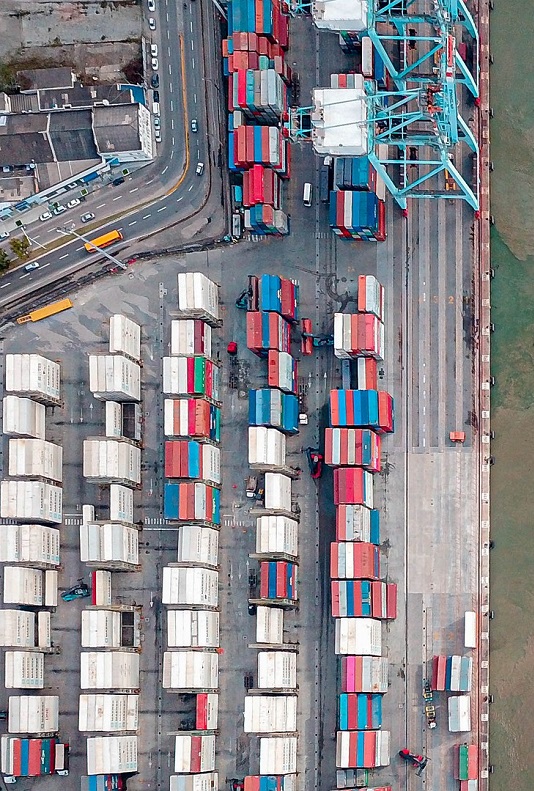Contributing £127 billion Gross Added Value, the logistics sector is vital to keeping the country’s economy moving. SOCOTEC’s Environment & Safety division is proud to serve a number of key clients within this industry, helping to keep the country stocked up on the services and resources it needs to function. Each of these clients have heavily relied upon SOCOTEC to ensure that they can continue to deliver their services in a safe and compliant manner.
Below, we take a look at some of the ways that SOCOTEC has supported the logistics sector and supply chain management, playing its part in keeping the country moving.
Managing unoccupied depots
SOCOTEC has been supporting a leading UK logistics company with its expansion plans, helping to ascertain and define compliance levels for some of its new hubs and depots. The client’s success has gone from strength to strength over the past two years, with the volume of parcels they deliver having doubled.
Many of the buildings that the client has acquired as new hubs are small local depots that serve the final few miles of a parcel’s journey. This means that they are often left unoccupied for extended periods of time and may contain old, outdated water systems/run the risk of housing Legionella bacteria. In addition, many of these buildings will have been constructed before the nationwide asbestos ban in 1999, meaning that they are at risk of housing asbestos-containing materials (ACMs).
To reduce the level of risk posed by Legionella and asbestos within these depots, SOCOTEC has been undertaking asbestos surveys and Legionella risk assessments on behalf of the client, ensuring that the premises they use to store their parcels remain safe and compliant for employees to use.
Monitoring health and safety risks
Thanks to the high quality, professional level of service provided by SOCOTEC’s Environment & Safety division, many of the organisation’s business units have maintained a longstanding relationship with a global logistics service provider since 2015. Given the fast-paced, rapidly changing working environment that the client operates within, it is critical that their employees are able to handle and manage the high volume of deliveries being processed every day and that health and safety risks are kept to a minimum.
SOCOTEC has successfully delivered a range of services for this particular client, ensuring that the health and safety risks of their working environments are constantly monitored, with any areas for improvement recommended and implemented where necessary. As a result of this continued success, SOCOTEC has gone on to provide additional services on behalf of the client, having recently signed a three-year contract that comprises:
- Occupational hygiene
- Environmental monitoring
- Legionella management
- Fire risk assessments
- Health and safety/training
- Asbestos surveys.
Since the beginning of 2021, SOCOTEC has also gone on to provide the following services:
- Legionella risk assessments and monitoring
- Legionella training to City & Guilds accredited standard
- Monitoring, sampling and inspections
- Noise monitoring to the Control of Noise at Work Regulation 2005
- Fire risk assessments to Regulatory Reform (Fire Safety) Order 2005.
Offering cost-saving benefits
Finally, SOCOTEC works with a multinational e-commerce organisation to provide risk assessments for fire safety and water hygiene across their warehouses, helping to determine the safety risks posed by fire and Legionella bacteria. Our team of health and safety consultants can carry out both of these risk assessments at the same time, which is beneficial from a cost-saving and environmental perspective for both SOCOTEC and the client.
While out on site delivering these services, SOCOTEC has also been able to advise as to how fire safety has been impacted by the COVID-19 pandemic, such as when fire doors have been held open to help reduce viral transmission. Furthermore, SOCOTEC has provided additional advice on the implementation and use of electric vehicles for this client – a service which is particularly useful given that there is currently little guidance on the commercial usage of EV delivery vehicles.

Transport and logistics
Ensuring health and safety compliance in the transport and logistics sector

Health and safety is an important factor to consider within the logistics sector, as there are many risks that can impact the industry as a whole. Indeed, common injuries in the logistics, haulage and distribution industries are caused by lorries in the workplace, falls from vehicles and poor load security.
To remain compliant with health and safety legislation and guidance, employers must ensure that their staff have received adequate training. They should also be made aware of the correct manual handling procedures, as this will ensure that workers are well equipped with the knowledge required to carry out their work safely.
Furthermore, in order to ensure the safety of logistics operations and the handling of materials, there should always be an efficient monitoring of all sites, routes, vehicles and staffs through technologies such as security escorts and CCTV cameras. Tracking applications for products and vehicles should also be implemented, such as bar coding, GPS and telematics.
Health and safety is an important factor to consider within the logistics sector, as there are many risks that can impact the industry as a whole. Indeed, common injuries in the logistics, haulage and distribution industries are caused by lorries in the workplace, falls from vehicles and poor load security.
To remain compliant with health and safety legislation and guidance, employers must ensure that their staff have received adequate training. They should also be made aware of the correct manual handling procedures, as this will ensure that workers are well equipped with the knowledge required to carry out their work safely.
Furthermore, in order to ensure the safety of logistics operations and the handling of materials, there should always be an efficient monitoring of all sites, routes, vehicles and staffs through technologies such as security escorts and CCTV cameras. Tracking applications for products and vehicles should also be implemented, such as bar coding, GPS and telematics.


